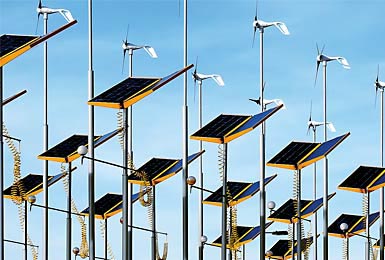The Department of Energy's Role in Promoting Green Projects
Which kinds of projects are benefiting, and how many permanent jobs are they expected to create?
September 2010

The Department of Energy (DOE) has recently completed an aggressive round of loans and grants to companies producing emerging technology for the clean-energy sector. From producers of solar panels to manufacturers of lithium ion batteries, companies are expanding plants and creating jobs at an accelerated pace across the country as a result of the DOE's targeted investments. And while communities celebrate the expansions - holding ribbon-cuttings and, in some cases, even hosting President Obama for the festivities - it remains to be seen if the companies expanding their operations will find sustainable markets for their products.
Projects in Motion
Financial support for projects comes in the form of outright grants or loan guarantees. The DOE is currently offering loan guarantees worth a total of $750 million in each of the following categories:
• Geothermal Energy
• Wave/Tidal
• Hydropower
• Wind
• Solar
In total, the DOE has made more than 70 awards, totaling $2.5 billion. Some of the biggest projects put in motion by DOE funds have included:
• A massive new concentrated solar power facility, covering 1,900 acres of the Arizona desert, where Abengoa Solar will use 900,000 mirrors to supply electricity to the Arizona Public Service Company. The project got financing with the help of a $1.45 billion grant from the DOE, and will create 5,100 construction jobs.
• An expansion of facilities in Loveland, Colorado for Abound Solar, which plans to add 1,200 new high-tech jobs in the manufacture of low-cost, cadmium telluride, thin-film photovoltaic solar modules. Abound received a DOE loan guarantee of $400 million on top of $200 million in venture capital that it was able to raise on its own.
• A new facility in Brownstown Township, Michigan, where General Motors will produce lithium ion batteries for use in supplying the electric GM vehicle known as the Chevy Volt. GM got a DOE grant of $105 million for the project.
• A new facility in Holland, Michigan, where Compact Power, Inc. will build battery cells to supply to GM in Brownstown. A DOE grant of $115 million helped pay for workers as well as battery components and supplies.
• A new facility in Kokomo, Indiana, where Delphi will manufacture power electronic components. The facility was funded in part by an $89.3 million grant from the DOE.
• A major expansion for Celgard LLC in Charlotte, North Carolina, where the company will expand its capacity for the production of separators, a key component in lithium ion batteries. The Charlotte expansion is the first of two phases. The second phase will include the construction of a new facility in Concord, North Carolina. The total cost of the two phases is projected to be $100 million, of which the DOE is contributing $49 million.
Project Announcements
Spartan Composites Plans Saltillo, Mississippi, Manufacturing Operations
02/14/2026
Hydrite Purchases Plans Laurens, South Carolina, Operations
02/13/2026
Blue Pony Energy Plans Lovington, New Mexico, Synthetic Fuel Operations
02/13/2026
James Composites Plans Marshall County. Kentucky, Manufacturing Operations
02/13/2026
Joby Aviation Plans Vandalia, Ohio, Operations
02/09/2026
Siemens Energy Plans Fort Payne, Alabama, Manufacturing Operations
02/09/2026
Most Read
-
Top States for Doing Business in 2024: A Continued Legacy of Excellence
Q3 2024
-
Data Centers in 2025: When Power Became the Gatekeeper
Q4 2025
-
Speed Built In—The Real Differentiator for 2026 Site Selection Projects
Q1 2026
-
Preparing for the Next USMCA Shake-Up
Q4 2025
-
Tariff Shockwaves Hit the Industrial Sector
Q4 2025
-
The New Industrial Revolution in Biotech
Q4 2025
-
Strategic Industries at the Crossroads: Defense, Aerospace, and Maritime Enter 2026
Q1 2026



